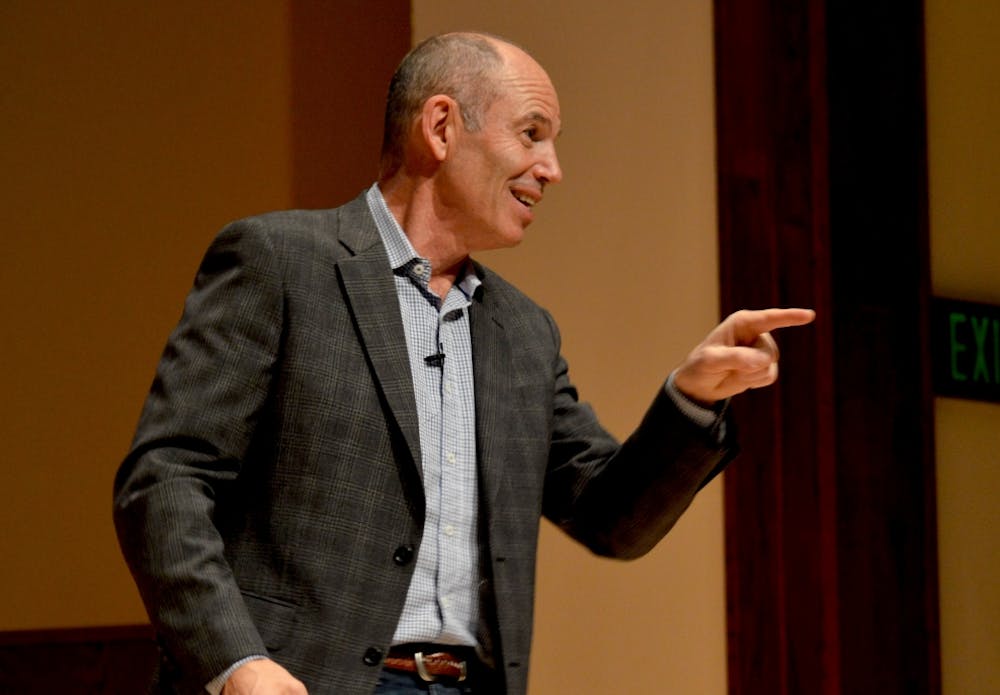Marc Randolph, the co-founder and former CEO of Netflix, spoke on Wednesday as the fifth and final guest of the 2016-2017 Robins Executive Speaker Series.
Randolph, 58, originally launched Netflix with current CEO Reed Hastings as a DVD rental-by-mail service on April 14, 1998. He stayed on as a board member until 2004, when he retired as an employee. He remains a sizeable stockholder and considers the company his “baby."
Randolph lives as a Silicon Valley veteran, continuing to operate as an entrepreneur, advisor and investor. He is responsible for several start-ups, the most recent being the analytics software company Looker Data Science, where he is currently a board member.

The presentation took place in Camp Concert Hall at approximately 6 p.m., when an audience mostly dressed in business attire shuffled in to fill the seats. As is tradition, a Richmond student welcomed Randolph onto the stage.
“I’ll be talking a good part about where ideas come from, and about whether they’re any good,” Randolph said of the speech he was about to present.
He proceeded to do just that, with one of his segments pointing out the new technologies, current trends and business models that entrepreneurs generally look toward before unveiling his own concise solution.
“Look for pain," he said. "You have to ask yourself, 'what’s wrong?' You’ve got to learn to see the world as an imperfect place. The more you begin to recognize the obstacles, almost automatically the ideas will come into your head."
Using a story about how hard it is to open paint buckets, Randolph guided the audience into discovering the relative ease with which ideas could possibly be thought up, if one was looking.
“Ideas do not spring out of thin air in some mythical Eureka! moment," Randolph said. "You have to look for ideas. You’ve got to train yourself to see them when they appear.”
Randolph spoke of Netflix’s small beginnings to its progression as an innovative DVD rental-by-mail service, making sure to elaborate in detail each decision made and each failure suffered along the way.
Throughout the story, he described the lengthy brainstorming and trial-and-error processes that went into improving the budding company via quick and cheap testing methods.
Enjoy what you're reading?
Signup for our newsletter
One method, “validation hacking," was described so that entrepreneurs could spend little to no major expense in testing potential enterprise ideas.
Ultimately, Randolph said that one didn't need to be in Silicon Valley, have special training or be the brightest. Instead, he explained his three key components of the best entrepreneurs: tolerance for risk, a trove of ideas and confidence.
“I mean, the type of risk that comes from starting down a path and not knowing where it’s going to go," he said. "It’s the type of risk that says that when you’re going into a restaurant when you’re traveling and you see something and you don’t know what it is, you order it. Sometimes great, sometimes frightening."

He went on to the importance of sheer number ideas as opposed to originality, complexity or even whether an idea was “good." To Randolph, good ideas and bad ones could not be determined as such before actual testing. What really mattered was that one had plenty of them to later narrow down and test through.
Finally, he said that confidence, and, by extension, optimism and persistence, were essential. Being able to shrug off failure, he said, was a valuable skill.
Randolph closed out the event with a Q&A session, but not before ending with his last quote of choice, a quote from Atari and Chuck E. Cheese founder Nolan Bushnell:
“Everyone who’s ever taken a shower has had an idea. It’s the person who gets out of the shower, dries off, and does something about it that makes the difference.”
After the presentation, a student asked what inspired him to give the presentation that he did.
“The single biggest piece of advice that’s given to every single kid is a variation of 'follow your dream,'" Randolph said. "But no one really says, 'here’s where to get started, here’s HOW to follow your dream."
Randolph decided to do the best he could in teaching students how to do just that.
Contact writer Arrman Kyaw at arrman.kyaw@richmond.edu. Follow Arrman on Twitter at @ArrmanKyaw.
Support independent student media
You can make a tax-deductible donation by clicking the button below, which takes you to our secure PayPal account. The page is set up to receive contributions in whatever amount you designate. We look forward to using the money we raise to further our mission of providing honest and accurate information to students, faculty, staff, alumni and others in the general public.
Donate Now



